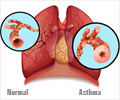People with chronic asthma have higher levels of inflammation and artery plaque, which could increase their risk of heart attack or stroke.
- There is an increased risk for carotid artery plaques among people with persistent asthma
- This implies that more significant forms of asthma are associated with more cardiovascular disease
What is Asthma
Asthma is a respiratory condition that makes it difficult to breathe by causing an individual's airways to become inflamed, frequently as a result of allergic reactions. It is well-recognized that chronic inflammation over time contributes to the development of artery plaques known as atherosclerosis and is linked to an increased risk of plaque rupture, which could result in a heart attack or stroke.Can Asthmatic Airway Inflammation Affect Arteries
“Many physicians and patients do not realize that asthmatic airway inflammation may affect the arteries, so for people with persistent asthma, addressing risk factors for cardiovascular disease may be helpful,” said lead study author Matthew C. Tattersall, D.O., M.S., assistant professor in the department of medicine at the University of Wisconsin in Madison. “The presence and burden of carotid artery plaque is a strong predictor of future cardiovascular events.”The Multi-Ethnic Study of Atherosclerosis (MESA) study data were utilized to conduct this analysis, which looked at the possible relationship between carotid artery plaque and asthma. In six different American locations- Baltimore, Chicago, New York, Los Angeles County, California, Forsyth County, North Carolina, and St. Paul, Minnesota- MESA, a study of nearly 7,000 adults, has been ongoing since 2000. All MESA participants were free of cardiovascular disease at the time of enrollment.
5029 adults with an average age of 61 with baseline cardiovascular disease risk factors and carotid ultrasound data had their health records reviewed by the researchers. The participant population is varied, with 26% of adults identifying as African American, 23% as Hispanic, and 12% as Chinese. In addition, there were 53% of female members of the group.
The cohort of participants in this analysis was divided into three groups: those with persistent asthma, those with intermittent asthma, and those without asthma. There were 109 participants in the subgroup with persistent asthma, which was defined as using daily controller medications to control asthma symptoms. There were 388 participants in the subgroup with intermittent asthma, which was defined as having a history of asthma but not using daily medications to control asthma symptoms.
All participants in the MESA study underwent an ultrasound of their left and right carotid arteries before the study started to look for any carotid artery plaque. The number of plaques in the walls of both carotid arteries was determined by the total plaque score. At the beginning of the MESA study, blood levels of the inflammatory biomarkers interleukin-6 (IL-6) and C-reactive protein (CRP) were also assessed.
The research revealed:
1. 67% of patients with persistent asthma and 49.5% of people with intermittent asthma had carotid plaque. There were often two carotid plaques in those with persistent asthma, compared to one in people with intermittent asthma.
2. 50.5% of the people who did not have asthma had a carotid plaque, with an average of one plaque.
3. Individuals with persistent asthma had nearly two times the likelihood of developing plaque in their carotid arteries than participants without asthma, even after controlling for age, sex, race, weight, other medical problems, prescription medication usage, and smoking.
Participants with persistent asthma reported greater levels of inflammatory biomarkers compared to those without asthma. The average IL-6 level in people with persistent asthma was 1.89 pg/mL, compared to 1.52 pg/mL in people without asthma. The relationship between persistent asthma and carotid artery plaque was not diminished, the researchers discovered, even after taking into account IL-6 and CRP in the fully adjusted study.
Asthma can Affect the Cardiovascular System
“This analysis tells us that the increased risk for carotid plaques among people with persistent asthma is probably affected by multiple factors,” Tattersall said. “Participants who have persistent asthma had elevated levels of inflammation in their blood, even though their asthma was treated with medication, which highlights the inflammatory features of asthma. We know that higher levels of inflammation lead to negative effects on the cardiovascular system.”Inflammatory diseases like arthritis and lupus were listed as cardiovascular risk-enhancing variables in the American Heart Association's 2019 primary prevention of cardiovascular disease guidelines. This study advances knowledge of how inflammatory illnesses affect cardiovascular health.
“The most important message from our findings is that more significant forms of asthma are associated with more cardiovascular disease and cardiovascular events,” Tattersall said. “Addressing cardiovascular risk factors through lifestyle and behavior adjustments can be a powerful preventive tool for patients with more severe forms of asthma.”
Source-Medindia
















